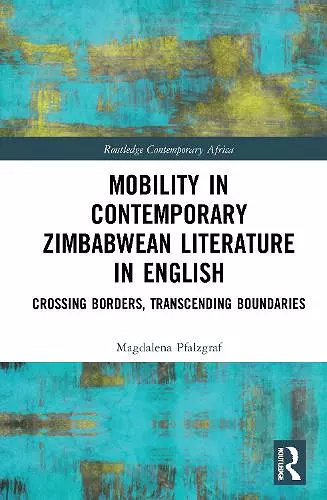Mobility in Contemporary Zimbabwean Literature in English
Crossing Borders, Transcending Boundaries
Format:Hardback
Publisher:Taylor & Francis Ltd
Published:6th Jul '21
Currently unavailable, and unfortunately no date known when it will be back
This hardback is available in another edition too:
- Paperback£41.99(9780367703929)

This monograph explores the concept of mobility in Zimbabwean works of fiction published in English between the introduction of the controversial Fast Track Land Reform Programme and the end of the Mugabe era.
Since 2000, Zimbabwe has experienced unprecedented levels of transnational out-migration in response to the political conflicts and economic downturn often referred to as the Zimbabwe Crisis. This, in turn, has led to an increased outpouring of literary texts about migration, both in locally produced texts and in works by authors based in the diaspora. Situating Zimbabwe’s recent literary developments in a wider context of Southern African writing and history, this book focuses on texts that portray movement within Zimbabwe’s cities, between village and city, to South Africa, and overseas. The author examines important developments and trends in recent Zimbabwean literature, investigating the link between state authoritarianism and control of mobility, and literature’s potential to intervene into dominant political discourses. The book includes in-depth analyses of ten recent works of fiction published in the post-2000 era and develops mobility as a key category of literary analysis of Zimbabwe’s contemporary literatures.
Setting out a rich dialogue between literary criticism and mobility studies, this book will be of interest to researchers of African literature, Southern Africa, migration, and mobility.
"Magdalena Pfalzgraf ’s Mobility in Contemporary Zimbabwean Literature in English is an important contribution to the scholarship on Zimbabwean literature and mobility. The book brings into sharp focus how mobility permeates the works of selected Zimbabwean authors and shapes their overall vision of what is commonly referred to as the Zimbabwean crisis…Mobility in Contemporary Zimbabwean Literature invites the reader to see the postcoloniality of Zimbabwean texts on mobility, albeit ones which write back to a metanarrative of place, time, and belonging authored by an authoritarian African regime. Depictions of movement and the ways protagonists engage with multiple spaces mimic the political forms of resistance which preoccupied the African resistance literatures of the 1960s and 1970s. Through a reconceptualization of mobility and a fresh reading of Zimbabwean texts, Pfalzgraf demonstrates what she calls "the subversive and liberatory potential" of literary mobilities."
Cuthbeth Tagwirei, University of the Witwatersrand
"Pfalzgraf’s book is an excellent addition to scholarship on mobilities in literature and to the fields of Zimbabwean and African literary studies. Through her inquisitive close readings, readers will gain insight into the tensions, complexities, and contradictions that shape literary texts in contemporary Zimbabwe. Her analysis of Shimmer Chinodya’s Strife is particularly discerning, identifying mutually exclusive impulses regarding mobility at work in the text. Pfalzgraf’s deep engagements therefore reveal subtleties that require familiarity with existing political conditions and national narratives as well as a keen eye for literary strategies that can, at least to some extent, question and subvert the official story."
Michelle Stork, Goethe-Universität Frankfurt Am Main
"[Mobility in Contemporary Zimbabwean Literature] offers a way out of the trap of “monological approaches which see the literary system as uniform, static and closed” (Tagwirei, “White Zimbabwean Writing” 5). By including texts by white writers in her study, Pfalzgraf breaks the artificial internal borders of the Zimbabwean literary canon; in Zimbabwean literary criticism influenced by the Third Chimurenga, white writing is marginalized and often viewed as not Zimbabwean. Critical studies by non-Zimbabwean whites are also viewed as suspect, Eurocentric and not suited to addressing the demands of the ultra-nationalistic agenda. In this context, Pfalzgraf’s book is a brave assertion that history, cultural
production, and national identity need to be “re-theorized as multiple, in the torsions and tensions of different, sometimes incompatible, perspectives, stories, times” (Young, White Mythologies 3)."
Kizito Zhiradzago Muchemwa, Postcolonial Text 4 Vol 18 No 3 (2023), Zimbabwe
"Magdalena Pfalzgraf’s book Mobility in Contemporary Zimbabwean Literature is a breath of fresh air. Pfalzgraf’s monograph makes an astute contribution to literary scholarship focused on Zimbabwean literature. Pfalzgraf expatiates migration as the number one issue that has beleaguered both the nation and its literature since the early 2000s to date. [...] individual lovers of Zimbabwean literature will do well to get this text and add it to their collections as a rare example of sober and scholarly Zimbabwean literary criticism."
Nhlanhla Dube, Research in African Literatures, Vol 53, No 4, (2023), South Africa
"Pfalzgraf makes a convincing case for reading twenty-first-century Zimbabwean literature through the concept of mobility as it relates to the frequent movements of Zimbabwe’s population throughout its history, but also specifically in relation to a large so-called out-migration connected to the economic and political unrest of the Zimbabwean Crisis. [...] Particularly astute are her observations of the ‘coexistence of stasis and mobility found in many literary engagements with the Zimbabwean Crisis’ (p. 130), which she calls ‘frantic stasis’ (p. 243). This resists any simplistic understanding and can function in various ways: for example, movement can signify a lack of progression ‘socially, economically, or spatially’ (p. 130). Literature’s resistance to authoritarian spatial control is funnelled through two motifs in particular. Firstly, that of ‘countermobilities’— that go ‘against the grain of local spatial orders’ and ‘conventional understandings of “African migration”’ (p. 248). And secondly, the motif of ‘micropolitics of place’, which focuses on small personal moves of resistance (p. 248)."
Gall, A., Manzo, K., Mcneill, D., Miller, B., Naruse, C. N., Niblett, M., ... & Zirra, M. (2023). XVII New Literatures. The Year’s Work in English Studies, 102(1)
ISBN: 9780367637811
Dimensions: unknown
Weight: 453g
260 pages